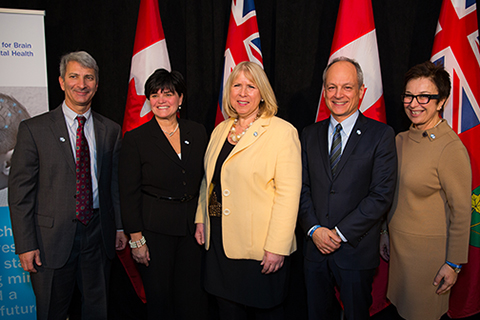U of T’s partnership with three other leading medical and research institutions in Toronto will address a major gap in Canada’s health-care system: the care of those suffering from mental and physical illness at the same time.
In January, U of T, the Centre for Addiction and Mental Health (CAMH), Sick Kids and Trillium Health Partners announced the creation of the Medical Psychiatry Alliance. The initiative is supported with a $20-million grant from the province and a landmark $20-million gift from an anonymous donor. Each of the four partners will raise additional funds to bring total capital for the project to $60 million.
More than 1.3 million Ontarians suffer from combined physical and mental illness. Studies of health systems around the world as well as first-hand experiences of health-care workers have shown that these patients are often ill-served – with potentially severe consequences. The challenge stems from the fact that our health-care system is designed to focus on either physical or mental illness, but not on both at the same time.
“Mental illness is often hidden within the symptoms of physical disorders, with treatment focusing on physical illness while the mental illness remains undiagnosed and untreated,” says Deb Matthews, Ontario’s minister of health and long-term care. “Intervening early and getting patients the treatment they need will help people living with these illnesses recover better and live healthy lives.”
John (not his real name), age 14, is one such patient. He was an excellent student and athlete until he developed severe chest pain, affecting his ability to eat and eventually preventing him from attending school. For four months, he underwent tests and hospitalization. He lost weight and suffered constant, unexplained chest pain. When no further medical tests could be done, John was sent to a psychiatrist.
When John described his pain he said “it feels like my heart is breaking.” The psychiatrist quickly uncovered what medical tests had failed to reveal: John’s father, to whom he’d been very close, had died suddenly one month before John’s symptoms started. When John was unable to psychologically process the loss, his grief manifested physically. This revelation triggered a tremendous emotional release. John’s symptoms finally abated, and he returned to school and full health.
For John, and many more patients like him, the lack of coordination between physical and mental health care can prolong an illness. But it can also lead to sharply elevated costs. This occurs because health-care providers, in the absence of a comprehensive diagnosis, may focus too much on the physical symptoms, resulting in unnecessary diagnostic testing and more frequent use of family doctors and emergency departments.
The Medical Psychiatry Alliance will develop a new approach to caring for patients with combined mental and physical illness, based upon research and new ways to educate health-care professionals. In these efforts, it builds upon the distinct strengths and patient populations of the four partners. Says Trevor Young, chair of U of T’s department of psychiatry: “We are confident that this is one of the most clear and direct opportunities to improve health care in Ontario.”
Test how much you know about mental health and illness with this quiz from CAMH.





